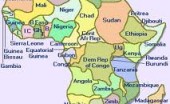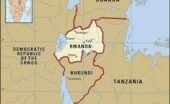Re Ian Bremmer 'Could third-party candidates upend the 2024 US election?' 3 April The current political movement in the USA…
Africa: Conflict and governance April 2024-
Written by Diana Thebaud Nicholson // April 23, 2024 // Africa // No comments
Why This is a Key Year for Democracy in Africa
19 elections are scheduled. Not all will be free or fair.
(Global Dispatches) 2024 is an important year for African democracy. At least 19 national elections are scheduled to take place this year. Not all of these elections will be free or fair — let alone competitive. Some of these elections will serve to ensconce leaders for life like Rwanda’s Paul Kagame. Others may serve to consolidate power following a coup. But genuine multi-party democracies like Ghana and South Africa are also headed to the polls in important elections.
Algeria, Botswana, Burkina Faso, Chad, Comoros, Ghana, Guinea, Guinea-Bissau, Mali, Mauritania, Mauritius, Mozambique, Namibia, Rwanda, Senegal, South Sudan, South Africa, Tunisia and Somaliland (not technically a country in the sense that it’s a UN member state, but quasi-independent, to be sure) are all scheduled to hold elections this year. (15 February)
23 April
Tanzania
World Bank suspends Tanzania tourism funding after claims of killings and evictions that caused the suffering of tens of thousands of villagers, according to a US-based rights group that has long urged the global lender to take such action.
(The World/AP) The World Bank has suspended financing intended to improve the management of natural resources and tourism assets in a remote part of southern Tanzania after allegations of killings, rape and forced evictions.
The plan to expand Ruaha national park has been beset by allegations of abuse, leading bank to withhold final $50m of $150m budget
The World Bank’s decision to suspend the $150 million project, which aims in a remote part of southern Tanzania, was “long overdue.”
At least $100 million has already been disbursed for the project, which started in 2017. The suspension of World Bank financing took effect April 18. The Oakland Institute, a California-based rights watchdog whose work focuses on marginalized communities, for years led calls for the World Bank to stop funding the project known by the acronym REGROW, documenting serious rights abuses suffered by Indigenous communities in the area.
8 April
‘This Will Finish Us’
How Gulf princes, the safari industry, and conservation groups are displacing the Maasai from the last of their Serengeti homeland
By Stephanie McCrummen
(The Atlantic) More and more of the finest, lushest land in northern Tanzania was being set aside for conservation, which turned out to mean for trophy hunters and tourists on “bespoke expeditions.”
Global leaders are seeking what they consider to be undeveloped land to meet a stated goal of conserving 30 percent of the planet’s surface by 2030. Corporations want undisturbed forests in order to offset pollution. Western conservation groups, which refer to the Maasai as “stakeholders” on their own land, exert great influence, as does a booming safari industry that sells an old and destructive myth—casting the Serengeti as some primordial wilderness, with the Maasai as cultural relics obstructing a perfect view.
The reality is that the Maasai have been stewards, integral to creating that very ecosystem. The same can be said of Indigenous groups around the world, to whom conservation often feels like a land grab. In the past two decades, more than a quarter million Indigenous people have been evicted to make way for ecotourism, carbon-offset schemes, and other activities that fall under the banner of conservation. That figure is expected to soar.
For all its accomplishments, the cause of saving the planet has become a trillion-dollar business, a global scramble in which wealthy nations are looking to the developing world not just for natural resources, but for nature itself. The wealthy players include not only Europeans and Americans but Arabs and Chinese and others. On the African continent, political leaders are enthusiastic about what so-called green foreign investment might mean for their own economies (and, maybe, their bank accounts).
7 April
Documenting the Rwandan genocide
(Al Jazeera) On April 7, 1994, one of the most harrowing events in modern history began: the Rwandan genocide.
5 April
Fears of violence grow as Somalia scraps power-sharing system
Semi-autonomous state of Puntland refuses to recognise changes to the fragile country’s constitution and has withdrawn from the federal system
An overhaul of Somalia’s constitution, scrapping its power-sharing system and handing the president increased control, is threatening to destabilise the fragile country, as its wealthiest and most stable state refuses to recognise the changes.
The amendments risk worsening violence, the information minister from the semi-autonomous state of Puntland has warned. Mohamud Aidid Dirir told the Guardian that “almost a totally new constitution” had been introduced without input from the state’s leaders. He accused the Somali president, Hassan Sheikh Mohamud, of using parliament to “gather authority into his hands”.
… Somalia’s central government collapsed in 1991, plunging the country into civil war, made worse with the emergence of the jihadist group al-Shabaab in the mid-2000s. Millions of people have been displaced by fighting between militants and the army, and years of drought caused by failed rains. About 6.9 million people are in need of humanitarian aid.
3 April
Zimbabwean president declares state of disaster due to drought
Emmerson Mnangagwa says country needs $2bn of aid as severe dry spell caused by El Niño afflicts southern Africa
(The Guardian) Due to poor rains, more than 2.7 million people will not have enough food to put on the table this year, he warned. This season’s grain harvest was expected to bring in just over half of the cereals needed to feed the nation, he said.
Former rebels in Central African Republic disarm but face few options. Wagner is one of them
(AP) — The bodies of children killed in the crossfire lay on the ground. It was too much for the rebel. After a year of fighting rivals across Central African Republic, the abuses were mounting and he wanted out.
The 42-year-old took advantage of a nationwide program meant to help people like him lay down their guns. He trained in entrepreneurship, received a bi-weekly stipend of about $35 and was told to return to civilian life.
But there’s little normal life for veteran fighters in one of the world’s most volatile countries. He couldn’t find work, was shunned by his family for his violent past and was threatened by enemies. Two years later he became a fighter again, this time helping Russian mercenaries combat the armed groups he had left.
… Another armed presence is Wagner, the Russian mercenary group tasked with protecting the presidency and securing the country. Its fighters have been accused by rights groups and civilians of recruiting a local militia to help it fight rebels while committing abuses and exploiting Central African Republic’s rich mines and forests.
2 April
Bassirou Diomaye Faye sworn in as Senegal’s youngest president
Leftwinger one of a group of opposition politicians freed from prison 10 days before presidential ballot
27 March
‘We are finally free’: Senegal hails new anti-establishment president
27 March
Togo’s opposition calls for protests to stop president from signing off on a new constitution
(AP) Togo’s government said a planned three-day protest this week over the arrest of opposition figures and new legislation scrapping president elections was illegal, a move that heightened tensions in the West African nation that has been ruled by the same family for almost 60 years. The interior and security ministries said the protests set to begin Thursday would seriously disturb public order. In a separate notice, the government also delayed parliamentary elections until April 29, pushing the vote back by just over a week. The proposed constitution passed by lawmakers in late March grants parliament the power to choose the president, doing away with direct elections. It makes it likely that President Faure Gnassingbe would be reelected when his mandate expires in 2025.
Some legal experts say the constitution actually restricts the power of future presidents as it introduces a one-term limit and hands over greater power to a figure similar to a prime minister. But opposition fears the role — officially, the president of the council of ministers — could become another avenue for Gnassingbe to extend his grip on power.



